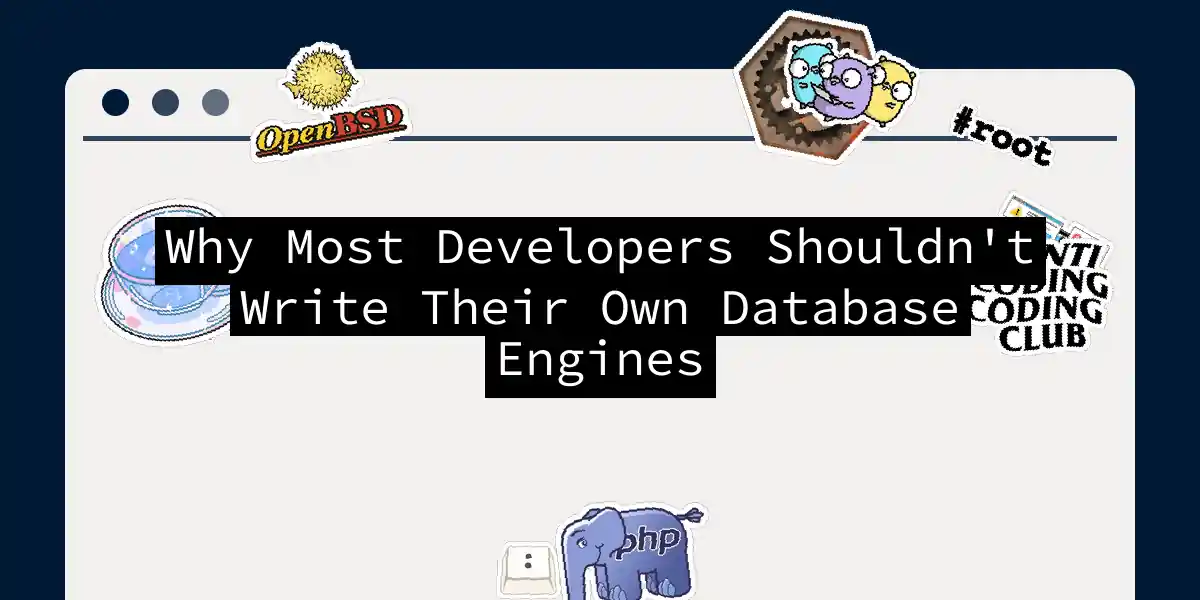Introduction to the Dilemma
Writing a database engine from scratch can be an alluring challenge for many developers. It’s like trying to build a car from scratch—sounds exciting, but is it really worth the effort? In this article, we’ll explore why most developers should avoid this endeavor and instead focus on leveraging existing, well-tested database systems.
Challenges in Database Development
Developing a database engine is a complex task that involves addressing several critical challenges:
Data Security and Compliance: Ensuring data security is paramount. This includes protecting against breaches, complying with regulations like GDPR, and maintaining data privacy[1]. Implementing robust access controls, encryption, and regular security audits are just a few of the measures needed to safeguard data[3].
Scalability and Performance: As data grows, so does the need for scalability and performance. This involves optimizing queries, indexing data effectively, and possibly sharding databases to distribute the load[1][5].
Data Consistency and Integrity: Maintaining data consistency across multiple users and transactions is crucial. This requires implementing locking mechanisms and transaction management techniques to prevent data corruption[1].
Lack of Standardization: Different organizations use different database systems, making it challenging for developers to switch between projects seamlessly[1].
The Pitfalls of Custom Database Engines
Complexity and Resource Intensity
Building a custom database engine requires a significant amount of resources—both in terms of time and expertise. It involves understanding complex algorithms for query optimization, indexing strategies, and concurrency control. Moreover, maintaining such a system over time can be overwhelming, especially when compared to using established databases that have been refined over years.
Performance Optimization
Optimizing database performance is a continuous challenge. Custom engines often lack the extensive testing and optimization that commercial databases undergo. For instance, optimizing SQL queries or implementing efficient indexing strategies can significantly improve performance, but these are areas where established databases have a clear advantage[3][5].
Security Risks
Security is another critical concern. Custom-built databases may not have the same level of security testing and patching as commercial ones, leaving them vulnerable to exploits. Regular security audits and updates are essential but can be resource-intensive for a custom solution[3].
Leveraging Existing Solutions
Why Use Established Databases?
Existing databases like MySQL, PostgreSQL, or SQL Server offer several advantages:
- Maturity and Stability: These systems have been extensively tested and refined over years, ensuring stability and reliability.
- Community Support: Large communities provide extensive documentation, forums, and tools for troubleshooting and optimization.
- Security: Regular updates and patches ensure that known vulnerabilities are addressed promptly.
- Scalability: Many established databases offer built-in scalability features like sharding and replication.
Example: Optimizing Queries with PostgreSQL
Let’s consider an example of optimizing a query in PostgreSQL. Suppose we have a table orders and we want to retrieve all orders for a specific customer:
-- Before optimization
SELECT * FROM orders WHERE customer_id = 123;
-- After optimization with indexing
CREATE INDEX idx_customer_id ON orders (customer_id);
SELECT * FROM orders WHERE customer_id = 123;
By creating an index on customer_id, we can significantly speed up the query.
Sequence Diagram: Query Optimization Process
Conclusion
While building a custom database engine can be an educational experience, it’s generally not advisable for production environments. Established databases offer stability, security, and scalability that are hard to replicate with a custom solution. By leveraging these existing systems, developers can focus on building robust applications rather than reinventing the wheel.
In the world of software development, it’s often more efficient to stand on the shoulders of giants rather than trying to build everything from scratch. So, unless you’re looking for a challenging project to hone your skills, it’s best to leave database engine development to the experts.
